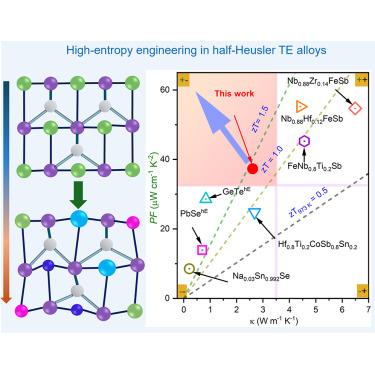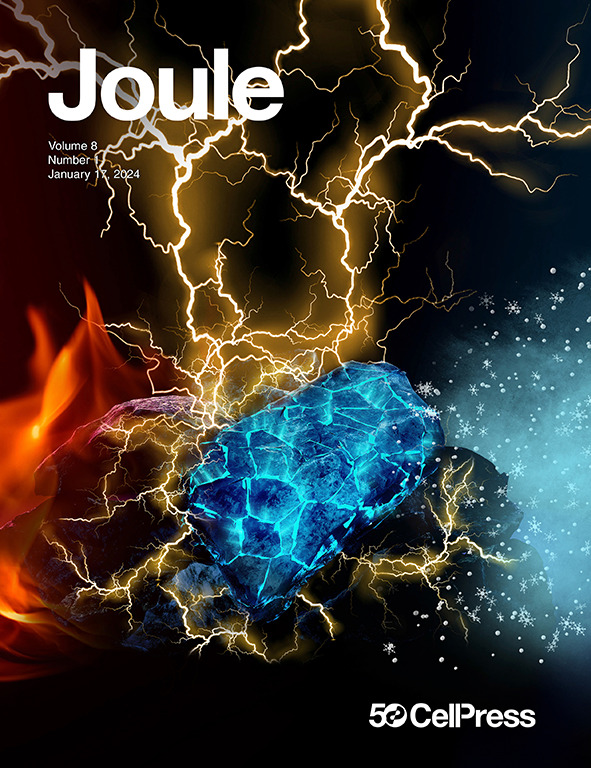High-entropy-driven half-Heusler alloys boost thermoelectric performance
IF 38.6
1区 材料科学
Q1 CHEMISTRY, PHYSICAL
引用次数: 0
Abstract
High-entropy engineering effectively reduces lattice thermal conductivity (κL) in thermoelectric (TE) materials; however, the chemical complexity of multiple elements in high-entropy materials often leads to phase segregation, limiting their electrical transport properties and overall TE performance. Herein, we report a p-type high-entropy stabilized single-phase half-Heusler alloy, MFeSb, specifically designed to enhance configurational entropy by introducing multiple element species on a single atomic site. This material exhibited low κL due to phonon group velocity reduction and strong phonon scattering from lattice strain generated through distorted lattices while maintaining a high power factor. The material demonstrated a record high figure of merit (zT) of 1.5 at 1,060 K, with an average zT of ∼0.92 over 300–1,060 K. Furthermore, superior conversion efficiencies of 15% and 14% for a single-leg and a unicouple module at a temperature difference of ΔT ∼671 K were achieved. Our findings provide a new avenue for enhancing TE material performance through high-entropy engineering.


高熵驱动半休斯勒合金提升热电性能
高熵工程可有效降低热电(TE)材料的晶格热导率(κL);然而,高熵材料中多种元素的化学复杂性往往会导致相分离,从而限制其电气传输特性和整体热电性能。在此,我们报告了一种 p 型高熵稳定单相半赫斯勒合金 MFeSb,该合金专门设计用于通过在单个原子位点上引入多种元素来增强构型熵。由于声子群速度降低以及扭曲晶格产生的晶格应变对声子的强烈散射,这种材料表现出较低的κL,同时保持了较高的功率因数。此外,在 ΔT ∼ 671 K 的温差条件下,单腿模块和单耦合模块的转换效率分别达到了 15%和 14%。我们的研究结果为通过高熵工程提高 TE 材料性能提供了一条新途径。
本文章由计算机程序翻译,如有差异,请以英文原文为准。
求助全文
约1分钟内获得全文
求助全文
来源期刊

Joule
Energy-General Energy
CiteScore
53.10
自引率
2.00%
发文量
198
期刊介绍:
Joule is a sister journal to Cell that focuses on research, analysis, and ideas related to sustainable energy. It aims to address the global challenge of the need for more sustainable energy solutions. Joule is a forward-looking journal that bridges disciplines and scales of energy research. It connects researchers and analysts working on scientific, technical, economic, policy, and social challenges related to sustainable energy. The journal covers a wide range of energy research, from fundamental laboratory studies on energy conversion and storage to global-level analysis. Joule aims to highlight and amplify the implications, challenges, and opportunities of novel energy research for different groups in the field.
 求助内容:
求助内容: 应助结果提醒方式:
应助结果提醒方式:


